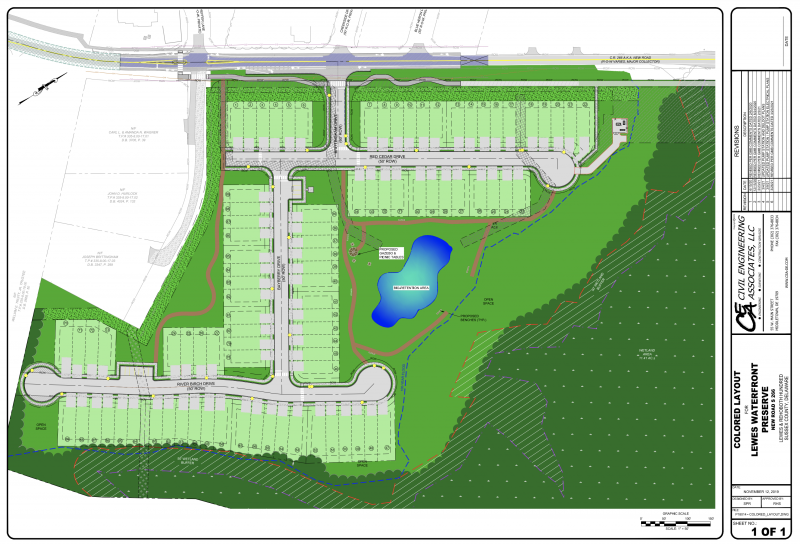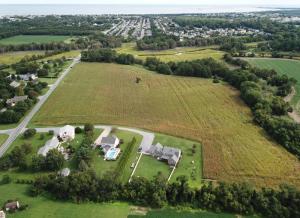Lewes Waterfront Preserve, an 89-unit townhouse community, has gained final approval.
Lewes Mayor and City Council voted 3-1 with one abstention to approve the project slated to be built on 34 acres along New Road near the Canary Creek bridge. Mayor Ted Becker and Councilmembers Carolyn Jones and Khalil Saliba voted in favor, while Councilman Tim Ritzert voted against. Councilman Andrew Williams abstained because he believed more conditions needed to be attached to the approval.
Council included three conditions: requiring a fire suppression system for each unit, prohibiting the use of vinyl building materials to encourage natural-looking structures, and requiring the use of natural material for a fence that will run parallel to New Road.
Williams would also have liked to see a condition requiring the developer, Setting Properties Inc., to provide a homeowners association-funded shuttle to take residents to downtown and the beach. He cited the plan’s 297 parking spaces and lack of amenities.
“We’ve been told the amenities here are benches and trails,” he said. There are also benches and a gazebo in the plan. “Those are not recreational amenities. People who live in this community are going to go out and look for recreational amenities – beaches, pickleball courts, tennis courts, basketball courts, parks. We have very little parking, as evidenced by the fact that we have two parking committees. It is a huge problem in the City of Lewes.”
In lieu of a shuttle, he said, he would have also accepted a financial contribution toward the purchase of property within the city for more parking.
Saliba also liked the shuttle idea.
“Because of the [parking] situation we’ve described here in Lewes, I ask that you [the developer] strongly consider a shuttle service as an amenity for the residents,” he said.
Williams also expressed concern about the safety of residents in the event of a fire. He cited the March 20 fire at a single-family home on Savannah Road. Because the city’s fire department is volunteer-based, he said, it took more than a few minutes for firefighters to get to the home. Although Lewes Waterfront Preserve received approval from the state fire marshal’s office, he said, the layout and density of the development present challenges that could affect response time. He urged council to attach a condition to require fire suppression in each unit, which it did, after an initial motion not including that condition failed to get a second.
He said he’d also like to see the developer make a financial contribution to the fire department. His suggestion was $50,000.
The developer’s attorney Jim Fuqua fired back at council’s consideration of such a condition.
“You can’t require one developer to contribute to the fire department,” he said. “If you want to make a law that every house has to contribute $1,000 or $100, you can. You can’t treat someone differently. It’s illegal.”
Becker urged the developer to make a good-faith donation or consider including an annual donation to the fire department in the homeowners’ association documents.
Another priority of Lewes officials recently has been encouraging the use of pervious pavement throughout the city. Developer Joseph Setting said he would consider porous pavement for the community’s driveways, but would not change his plan to use it for streets. Ron Sutton, the developer’s engineer, said it’s too late in the process to consider porous pavement.
“Porous pavement requires special design,” he said. “It’s not just throwing porous pavement out there. We have [to create a] drain system to collect it and run it to catch basins, or we would have to do a bunch of infiltration tests out there.”
After listening to council’s concerns about the project, Fuqua aired his frustrations about the City of Lewes’ approval system.
“Your system is flawed,” he said. “We’ve been working with the planning commission for close to three years on this project, and [city council’s] public hearing was just a couple weeks ago. We spent two-and-a-half years hashing this stuff out, and, in all fairness to the developer, now we’re hearing [council’s concerns] for the first time. That’s a flawed system.”
Setting said he’s been working tirelessly with the Historic Lewes Scenic Byway Committee to ensure the viewscape from New Road is appropriate. Included in the plan is a 10-foot-wide multi-modal path set 20 feet off New Road. On the development side of the path, there will be a 30-foot buffer with a 4-foot landscaped berm and a variety of trees before reaching a 5-foot fence. Setting said the fence likely will not be seen once trees and landscaping mature. The developer has also agreed to limit the buildings along New Road to two stories.
Those efforts were not enough for Ritzert.
“I do not associate this type of design with a Lewes value,” he said. “We have neighborhoods that face their streets.”
He said Lewes Waterfront Preserve will be the first impression people get of Lewes as they enter the city.
“Those homes are turning their backs on people coming into town,” he said. “That bothers me. I don’t believe this project design reflects well on the city. I think we can do better than this.”
The project will be the first community developed in the AX-RES, annexation residential, zoning district. Mayor and city council approved the AX-RES and AX-MIX, annexation mixed, zones in May 2018 as transition areas between the city’s regulations and those of Sussex County. Among the permitted uses included in AX-RES are townhouses, which were permitted by conditional use in the county area. By fall 2018, Setting Properties Inc. submitted an application for annexation with plans to later submit another application for a townhouse community.
Like Ritzert, Williams also expressed his displeasure with the project.
“All of New Road was farmland,” Williams said. “If you want to talk about a neighborhood that’s characteristic of Lewes, it would take on more of that [farmland] characteristic – larger plots that might be able to be farmed organically. I can’t make a condition [for approval] around that, but I will point out my disappointment in [the developer’s] choices, because [he] had choices here.”
Nick Roth is the news editor. He has been with the Cape Gazette since 2012, previously covering town beats in Milton and Lewes. In addition to serving on the editorial board and handling page layout, Nick is responsible for the weekly Delaware History in Photographs feature and enjoys writing stories about the Cape Region’s history. Prior to the Cape Gazette, Nick worked for the Delmarva Media Group, including the Delaware Wave, Delaware Coast Press and Salisbury Daily Times. He also contributed to The News Journal. Originally from Boyertown, Pa., Nick attended Shippensburg University in central Pennsylvania, graduating in 2007 with a bachelor’s degree in journalism. He’s won several MDDC awards during his career for both writing and photography. In his free time, he enjoys golfing, going to the beach with his family and cheering for Philadelphia sports teams.






















































